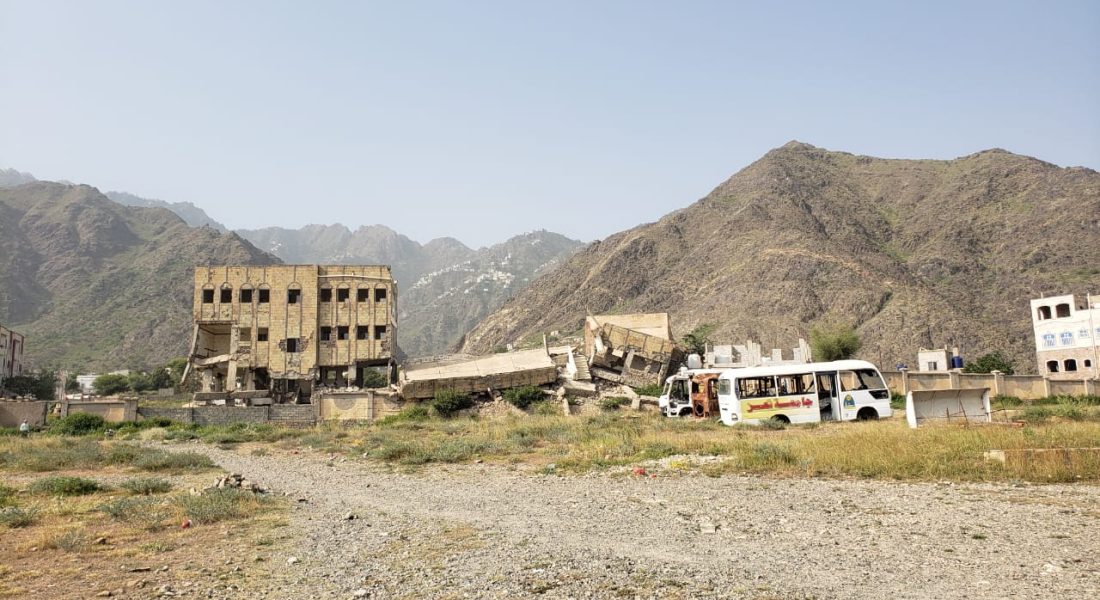Landmines in Yemen have an extensive history of impacting, injuring, and killing civilians. By targeting unarmed civilians’ livelihoods and displacing them, landmines continue to hamper many aspects of life in Yemen effectively leading to the economic deterioration of families and further spread of poverty.
Since the conflict between Yemen’s pro-government troops and allied forces and Houthi militias and their allies escalated in 2014, liberated strategic areas have been left littered with Houthi anti-personnel mines and anti-tank mines, along with unexploded remnants of war.
Farming communities still in fear
Al-Remah, an area located in Al Mokha region, has borne the brunt of indiscriminately and randomly planted landmines on Yemen’s West Coast.
Farmer Amin Haidar explained the magnitude of the tragedy of the residents of the area which, saying, “Landmines prevented Yemenis from working on their farms, as many of them remained fallow and under siege from the mines. Then, Project Masam’s teams arrived in the area and cleared many of these farms, restoring the agricultural activities to their former state after ending the danger that threatened them and killed my two brothers in these farms. Today, these farms have become safe thanks to the efforts of Project Masam, as our suffering with hunger and displacement has ended.”
Hassan al-Jahouri, the leader of the demining Team 17 who is currently working in Al-Remah, explained that Haidar is one of many farmers in this otherwise fertile agricultural area who were forced to halt their farming activities for fear of the explosive devices planted in the soil, behind rocks and in bushes.
Al-Jahouri indicated that Project Masam is working in full swing to clear this area of mines and enable its residents to return to their farms and resume their agricultural activities.
He added that his team adheres to safety measures by walking in safe corridors in the direction of the farms that they are clearing. These efforts have resulted in enabling some of the residents to return from displacement, reclaim their farms, and harvest their crops after Project Masam had declared them completely clear of the potentially deadly mines.
Vital facilities targets of landmines
Landmines have also deprived Yemenis from several other other vital facilities and services.
Abdullah Naji, director of the Water and Sanitation Corporation, of the Al-Mokha Branch, highlighted how “mines have affected vital facilities in Yemen, including water, and have threatened investors who have refrained from digging wells due to the spread of mines. Also, water projects have been disrupted, which has had a significant impact on people’s lives and the agricultural activities in general.”
He explained further: “Had it not been for Project Masam, many innocent people would not have been able to get their needs of fresh water, but thanks to Project Masam’s efforts many Yemeni governorates have been secured against the danger of mines by demining many areas, contributing to the resumption of safe life, and restoring many vital facilities.”
Yemenis are also struggling to meet their electricity needs.
While the current conflict has left the electricity supply in a dire state across southern parts of the country, landmines planted near and in serviced or potential stations have added an extra limitation to existing recurrent power outages, limited geographical access and steep prices. By clearing existing power stations and areas earmarked for new energy investment projects, Project Masam is allowing civilians to access this vital service again.
Sami Saeed, leader of Team 26, said: “My team is currently working on surveying an area where a solar-powered power station will be established in the Al-Khawkha district, on an area estimated at 300,000 square meters, and we are continuing to achieve this mission to the fullest. The Masam project attaches special importance to vital projects related to people’s livelihood to bring life back to normal and restore development activities, therefore, the Masam project will electrify the district of Al-Khawkha as well as the district of Hays, where more than 200,000 people live.”
Education vital to eliminating poverty
Project Masam also vowed to continue working on clearing educational institutions – another vital sector which suffered greatly from flagrant violations because of the spread of mines, and which represents one of the pillars of Yemen’s development and redevelopment.
Abdul Khaliq Atshan, press secretary of the Yemeni Teachers’ Syndicate, indicated that the Yemeni teaching staff, educational institutions, and students, who he claimed represent the basis for Yemen’s future, constantly face the threat of landmines.
Dr. Ali Al-Abab, Deputy Minister of Education, said that the Houthis’ entry into the capital, Sana’a, led to a significant deterioration in the educational sector, as, he said, the armed group was determined to control the educational process by imposing a new national academic curriculum (which promotes sectarianism and Islamic fundamentalism, and by planting explosive devices in schoolgrounds.
More than 400 schools have been destroyed or made partially inoperable by landmines – in what Al-Abab described as a clear indication of the pursuit of these militias to spread ignorance among the Yemeni people as well as sectarian ideas to push students into the battlefronts.
Because education is vital to eliminating poverty in Yemen, Project Masam provides safe places for students and teaching staff by clearing educational institutions including universities and schools.

